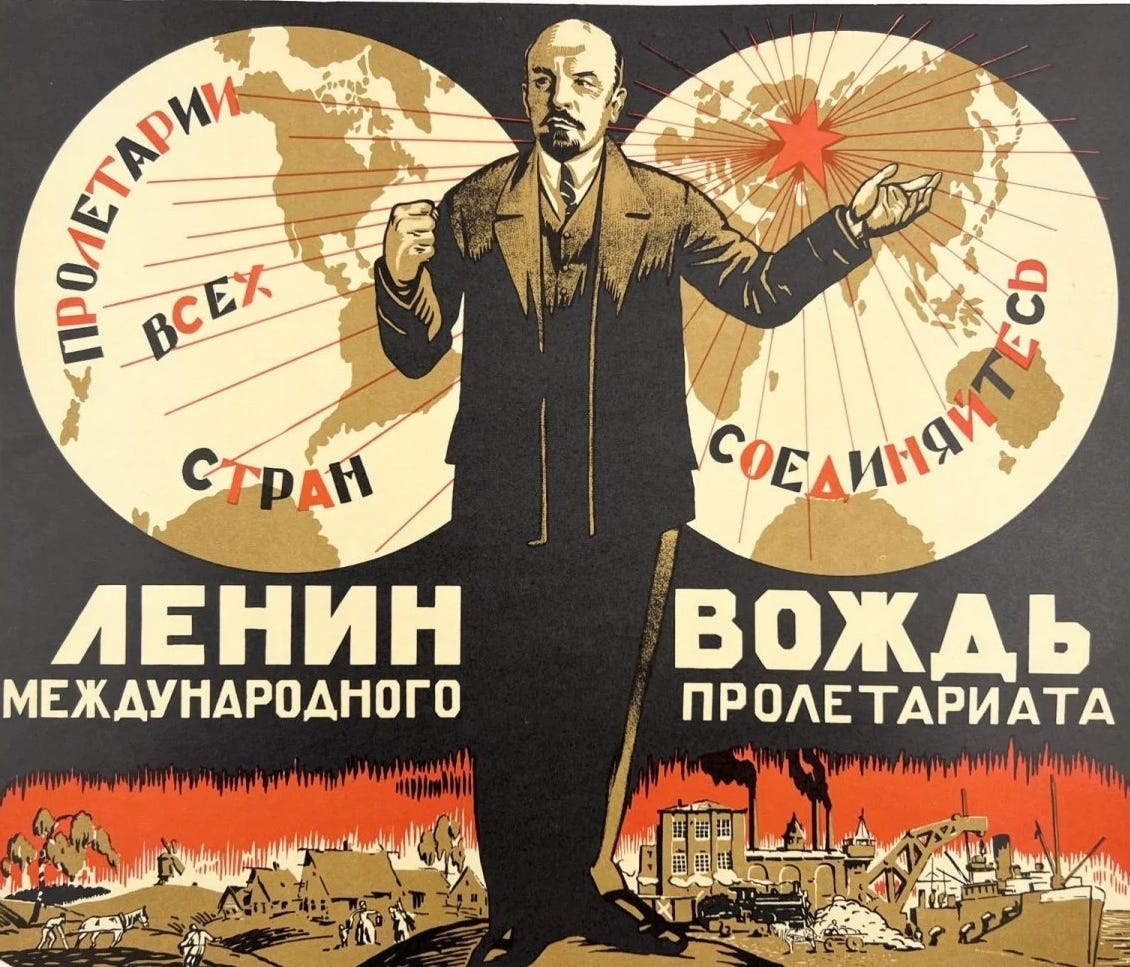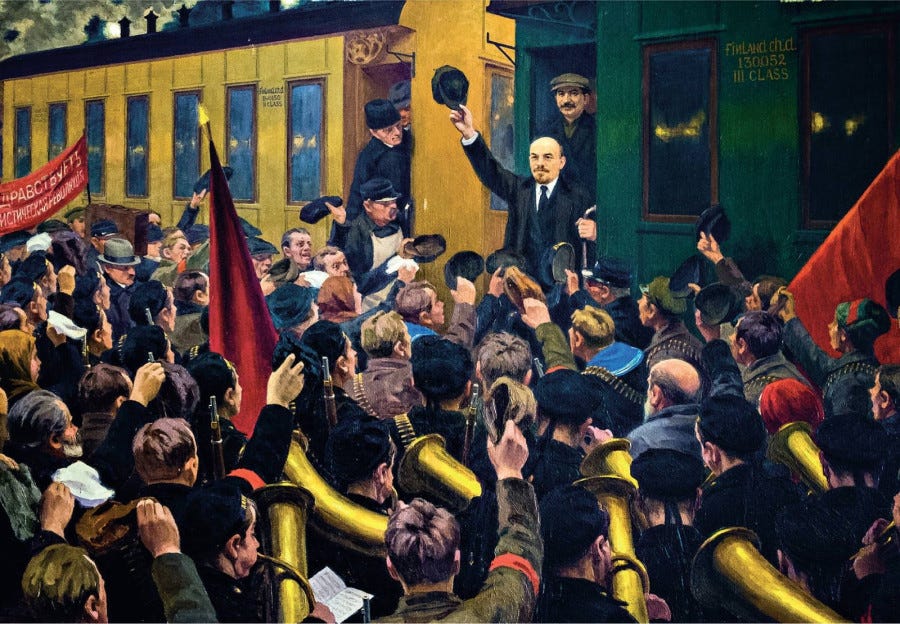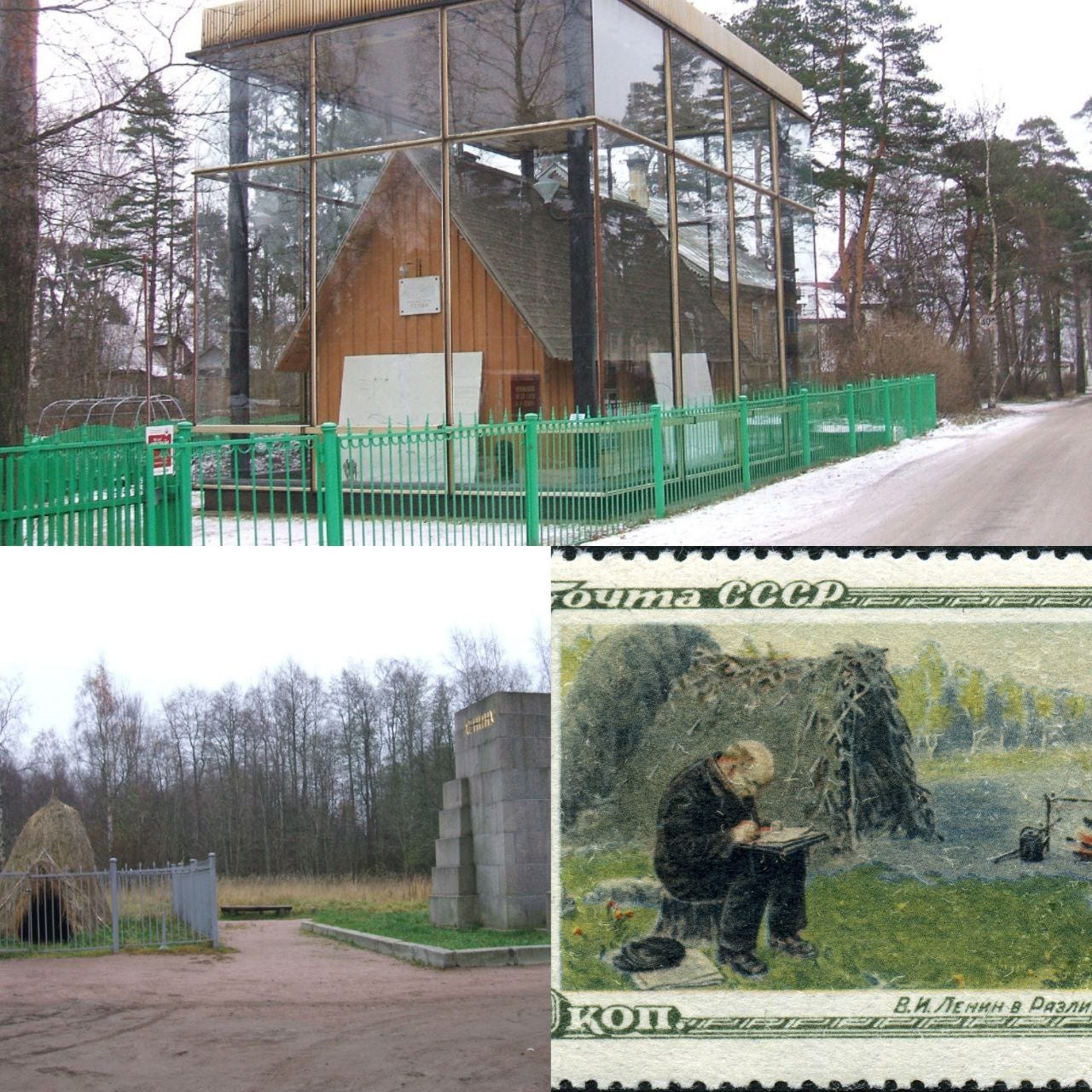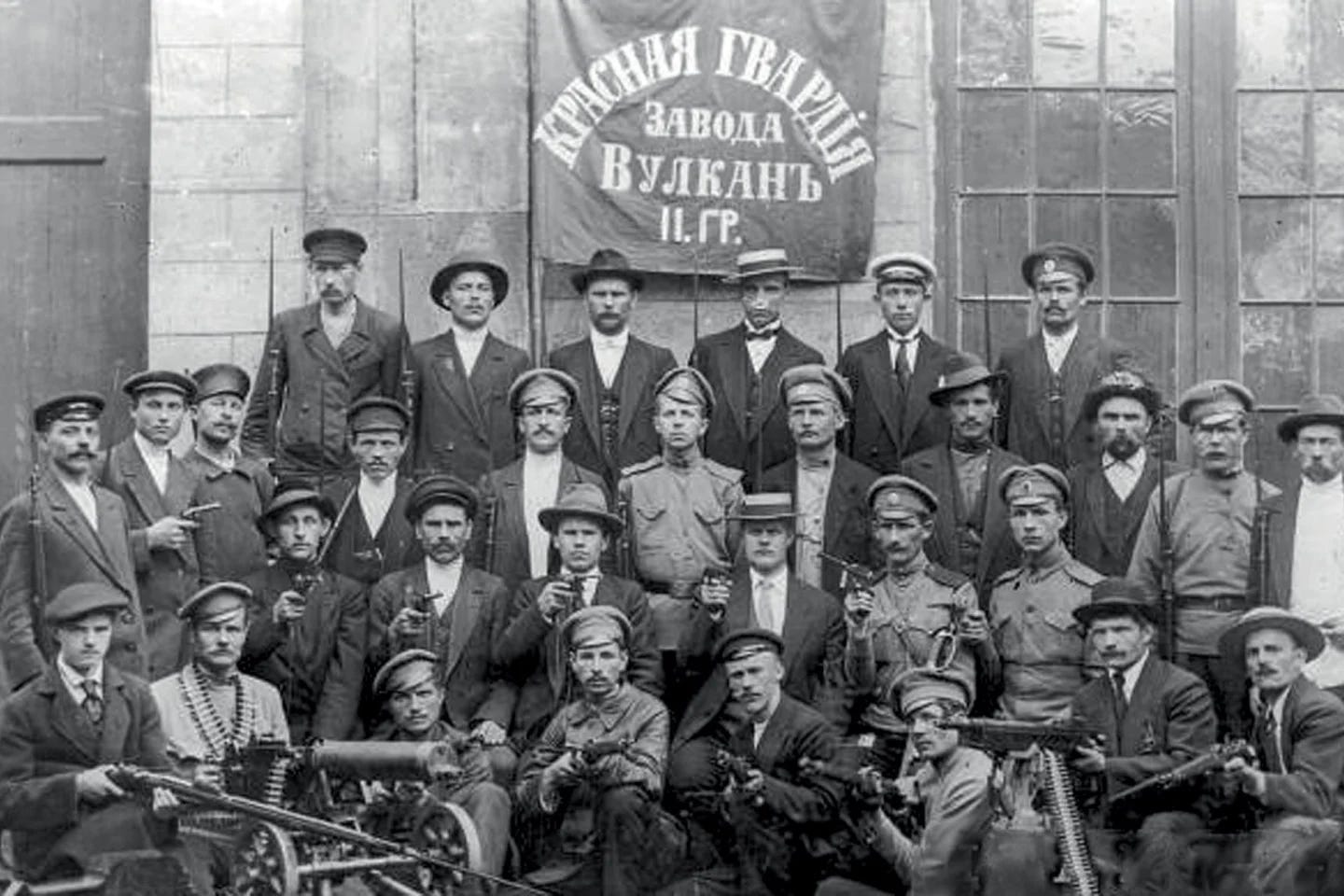The Birth of Soviet Union
The 1910s, Part 1 - Between February and October
This text is a sequel to my Soviet Identity text about the 1970s in the USSR. The original was received well enough for me to work on completing the series about the Soviet Union. While you could say the theme is already overused, few texts are written from a specifically post-Trotskyist perspective. This makes my effort somewhat fresh and free from common tropes of those groups who are interested in either pure demonization or pure apologetics of the country and its socio-economic model.
We already analyzed how the final product of that project, the Soviet people, turned out. We also looked upon the more esoteric elements of proto-Marxist socialism in my Utopian Socialism text and learned that not all religions were equally abhorrent to the Bolsheviks. Now let’s go back to the beginning of the USSR and remember what the 1910s looked like in the cradle of the world revolution.
Initially, I wanted to combine the 1910s and 1920s in one text, considering that just three years in the 1910s can be considered Soviet. Then I remembered how my Twitter mutual from Switzerland revealed that he was not at all aware of the terrorist activities and eventual execution of Lenin’s elder brother Aleksandr Ulyanov, an important historical moment. In light that most of my audience is in Europe and America, I decided to make this part larger and more detailed.

Socialists of the Russian Empire shared both the immense long-term optimism of their European comrades, related to the inevitable appearance of a new classless society, and local practical pessimism related to what they saw as underdeveloped economic conditions in the country and a lack of organizational unity among various left-leaning movements. While the split between Marxists and Anarchists was already well-developed, personal relationships were friendly enough to allow constant migrations between the groups. Many future Bolsheviks were welcome among Anarchists, particularly among sailors of Baltic and Black Sea fleets - the backbone of Anarchism in czarist Russia.
Still, even combined, the joint influence of Marxists and Anarchists was marginal well into the advanced stages of World War I and until the election of the short-lived Constituent Assembly. Meanwhile, dominant parties of Constitutional Democrats (better known as kadets) and anti-Marxist Socialist Revolutionaries (SRs) produced most of the anti-regime resentment between 1914, the beginning of the war, and the February Revolution of 1917. Bolsheviks were the sole faction of the State Duma to condemn Russian participation in the war right away in 1914. Their mandates were revoked, and some of them were arrested, but more importantly - this occasion forced Lenin to denounce social democracy as a current, denounce the leaders of the then-influential Second International, and condemn their failure to distance themselves from the ruling classes of their respective countries. He put forward the motto of turning the imperialist war into a civil one in the name of the creation of the “Republican United States of Europe” (the “War and Russian social democracy” Manifesto of 1914).
The revolutionary fervor of kadets (liberals by our modern standards) and SRs (liberal-adjacent social democrats by our standards) was patriotic, militaristic, and moderately chauvinist. They viewed Czar Nicholas II as inefficient and his bureaucrat apparatus as outdated. But, unlike Lenin, they had nothing against the war in principle. The longer it dragged on, the less patient these forces were becoming. A coordinated campaign promoting the view that the royal family collaborated with the enemy, the Germans, started in early 1916. It tied Empress Consort Alexandra Feodorovna and famous playboy monk Grigory Rasputin with German intelligence. This trend culminated in the historical speech "Stupidity or treason" by kadet leader Milykov, who chose to live in a British embassy for a few months between this speech and the February Revolution.
During the Synodal period(1700-1917), Russian Czars were de-facto Popes of the Russian Orthodox Church. They were in full administrative control. Yet, the manner in which the state viewed the Church and the Church viewed the state were different. Peter the Great succeeded in bringing the Western, half-Protestant utilitarian attitude to czarist bureaucracy. They organized a department of Orthodox faith, which conceived the Church as a religious projection of the State. Actual priests however kept the Byzantine theocratic attitude, which viewed the monarch’s enthronement as initiation into God’s servitude. This is why the Church has mostly abstained from the events of the February Revolution. Even Black Hundredists, the most influential monarchist right-wing movement in the late Russian Empire, were predominantly petty bourgeois. Not bureaucratic or clerical. This lesson is apparently learned in modern Russia. Where, despite the thorough statist authoritarianism, the Patriarch enjoys limited autonomy and sometimes even allows himself to criticize Putin.
Even though socialist provocateurs and affiliated factory workers participated in the February Revolution, their role was secondary and observatory. Liberals themselves used red flags and red ribbons, despite not respecting the succession of these symbols from the Paris Commune. They insisted on absolute, all-inclusive freedom of speech and also promoted the usage of comrade/tovarish word.
Lenin himself was in Switzerland at the time, expressing serious skepticism that his followers would ever lead a proper Revolution. In the face of new realities, he had to reassess his attitude. Together with his wife Krupskaya, mistress Armand, and a host of assorted political emigres (around 200 people), he boards the sealed train, generously provided by Germany after explicit British refusal shortly before. The fertile soil of already existing liberal Germanophobia received new seeds, the seeds that grew throughout the entire Soviet period despite all the official explanations.
Meanwhile, British involvement was at least as serious. But no one, including the Bolsheviks, was interested in propping up this angle on a mass scale. The activities of British Ambassador Buchanan gave rise to at least two theories in post-Soviet space. The first is that he allegedly organized the February Revolution to increase Russia's military capabilities, and the second is that he actively supported right-winger Lavr Kornilov for the same reasons. In his diary, Buchanan wrote: "Although all my sympathies were with Kornilov, I nevertheless tried my utmost to oppose the idea of a military coup (against Kerensky - A.V.)". At the beginning of 1917, he supported the transition to a constitutional monarchy. On April 17, during a conversation with Milyukov, he insisted on Lenin's arrest. In June, he actively supported the offensive at the front. In July, he condemned the Bolshevik uprising, and in August, he supported Kornilov's movement. In October, he expressed a negative attitude toward the Bolshevik armed uprising and, on October 23, demanded the immediate arrest of Trotsky.
Trotsky, this future revolutionary lion, learned about the Czar’s abdication on 1522 Vyse Avenue in the Bronx, New York. Being a well-traveled man, he was present at many important events of Russian Marxism, including the 1903 Congress of the Russian Social Democratic Labour Party (RSDLP) in Brussels and London, where the Bolshevik-Menshevik split first occurred. He knew George Bernard Shaw and H.G. Wells. He lived in Austria, Germany, France, and Switzerland. And yet, he was content with being a journalist for Russian emigrants in America and even opposed some of Lenin’s ideas from half-Menshevik positions. Apparently, he did secure some serious money in America. Otherwise, it is difficult to explain the rapid rise of his influence upon the unexpected relocation to Petrograd, the forgiveness of Lenin, and his ability to control the most dangerous, armed elements of Petrograd’s Red Guard, including anarchist sailors.
The Provisional Government freed Stalin from his last Siberian exile in March. He spent four years in an extremely cold polar village Kureyka, located near the imposing Putorana Plateau. He had the most proletarian reputation among these three, taking part in numerous robberies and shootings. As an ideologue, he was known as moderate, which is why he was entrusted with diplomacy with other parties on behalf of the Bolsheviks. He was also friendly with fellow Georgian - Chkheidze, Menshevik chairman of Petrograd Soviet. All this allowed him to become the party’s top gray bureaucrat just a few months after leaving Siberia.
Meanwhile, after securing the money of Swedish social democrats en route, Lenin’s train arrives in Petrograd, where a fair number of activists meet it. They are ready to wreak havoc. While eyeing a seemingly imminent retreat to Finland, where several safehouses were prepared in advance.
Chkheidze and his fellow PetroSoviet Mensheviks met this train on Petrograd’s Finland Station, offering Lenin to “join revolutionary and democratic forces to protect the February Revolution from inner and outside threats”. Lenin reacts provocatively, turns his back to Chkheidze, and addresses the present soldiers, sailors, and workers instead. He gives this speech: “Dear comrades, soldiers, sailors, and workers! I am happy to greet you as the victorious Russian Revolution, to greet you as the vanguard of the global proletarian army… The predatory imperialist war is the beginning of a civil war throughout Europe… The hour is near when, following the call of our comrade Karl Liebknecht, the peoples will turn their weapons against their exploiters—the capitalists… The dawn of the world socialist revolution has already broken… In Germany, everything is boiling… Any day now, perhaps even today, the collapse of the entire European imperialist system may erupt. The Russian Revolution, accomplished by you, has initiated it and opened a new era. Long live the world socialist revolution!”

Immediately upon arrival, Lenin was outraged by what he saw as anti-revolutionary opportunism among adjacent activists. Whereas the Bolshevik-Menshevik split was a vivid, real thing for leftist Russian emigrants in Europe, many Petrograd leftists had no strong opinions on the issue. To them, Lenin was an important but somewhat unremarkable good guy. They were happy that he is able to return and strengthen their ranks, they never put his philosophical capabilities in doubt, but they weren’t declaring him their one and only leader right away. Soviets in their initial sense (councils), revolutionary sources of political legitimacy, were staffed with all manner of leftists. Bolsheviks had no majority in them. Even Trotsky did not join the Bolsheviks immediately upon arrival. Initially, he was a member of the so-called Interdistrictites group. He was invited there by another Russophone Jew from central Ukraine (Cherkasy) - Moisey Uritsky. This guy will play an important role a bit later. The group itself was an interesting attempt to reconcile left-leaning Mensheviks and petty-bourgeois elements with romantics of underground banditry. Thanks to the input of Uritsky and Trotsky it actually worked.
To influence this situation, Lenin wrote his famous April Theses as a guidance for those who want to cooperate with him: The transition from the first stage to the second — the transfer of power to the proletariat and peasantry — is characterized, on the one hand, by the maximum degree of legality (right now Russia is the freest and most advanced country in the world), and on the other hand, by the masses’ naive and unconscious trust in the government. Even our Bolsheviks exhibit a degree of trust toward the government. This can only be explained by the intoxication of the revolution. This is the death of socialism. You, comrades, are showing trust in the government. If that is the case, then we are not on the same path. I would rather remain in the minority. One Liebknecht is worth more than 110 social-patriots of Steklov and Chkheidze type. If you sympathize with Liebknecht and yet extend even a finger to the social-patriots, it would be a betrayal of international socialism.
Meanwhile, liberals, right-leaning SRs, and the remnants of now-forbidden Black Hundredists still had their eyes on the frontlines, where they wanted to fight until the complete victory over Germany.

Despite Lenin’s efforts, the majority of Soviets and even the majority of Bolsheviks weren’t ready to enter the open struggle with the Provisional Government. Februarists have more or less successfully coopted the revolutionary fervor. Influential Menshevik Marxist Plekhanov called the April Theses an idiocy. Another Menshevik, Tsereteli, said that such a position makes Lenin an anarchist and Bakunin’s successor. Such Bolsheviks as Kamenev, Dzerzhinsky, and Kalinin also initially condemned them. Very few were ready to fight “social-patriotism” or defensism/oboronchestvo as it is also known in various translations. Lenin overcame this problem by introducing new, more radical people to the party, including many of those who just left Siberian prisons and viewed themselves as more proletarian than those who were able to remain in Petrograd during czarism. These people helped to approve the Theses at the All-Russian Conference of Bolsheviks in late April. So, in the end, Lenin managed to suppress the opposition inside the party in less than a month. Around the same time first skirmishes between those who sided with Lenin and Provisional Government loyalists started to happen. In response, Menshevist PetroSoviet, the one humiliated at Finland Station, declares Bolsheviks traitors of the Revolution. Skirmishes provoke a crisis in the government, which ends up in the accession of PetroSoviet Mensheviks to the Provisional Government at the expense of kadets and liberals of noble origin. Right-leaning Socialist Revolutionary Kerensky gets the post of Military Minister.
Shortly after, Lenin and Trotsky start forming the Red Guard, armed workers militia, out those those industrial workers who sympathize with their ideas. The number of people there will reach 200,000 across the entire country and 30,000 in Petrograd alone in less than a year.
The situation remained more or less stable until the failed Kerensky offensive in June. A combination of military defeats, demoralization, and general loss of purpose created fertile soil for the radicalization of all possible social strata. Leftists became more left, rightists became more right. Kerensky became the most powerful man in the country, assuming the post of Prime Minister. General Lavr Kornilov attempts to introduce reactionary stoicism in the army but fails, succeeding only in gaining enough supporters for his future civil war efforts.
Funny. Although Kornilov looked like a perfect monarchist should look, and that’s how he is usually viewed by uneducated Russian right-wingers who never go deeper than anti-Bolshevik identity, according to many testimonies of his contemporaries (Denikin included) he was actually a fairly centrist liberal democrat. A more refined version of post-Soviet general Alexander Lebed. Class attractiveness of liberalism has not changed since these years - the higher your rank, the more liberal you try to look. If only to be respectable on an international level.
This is also when the Ukrainian question became important to ideological struggles in the capital. The willingness of the Provisional Government to allow the Ukrainian Central Rada to form a national statute led to a serious split among co-reigning kadets, with many of their important members resigning in protest (Shakhvskoy, Manuilov, Shingarev). This is probably when the currently popular Ukrainian saying that “Russian liberal ends on Ukrainian question” came to be.

Next month will be known as July Days, a series of skirmishes that proclaimed the need to depose the government and transfer all the power to the Soviets (where Bolsheviks were still in the minority).
Many historians are confused about what it was exactly. Some think it was a Kerensky provocation, a preventive attempt to destroy the reputation of the Bolsheviks before they had the chance to activate the Red Guard cells. Some think it was a failed attempt at socialist revolution, which revealed Lenin’s weakness as a military strategist. I think that it was the peak of Russian leftist Anarchism and nobody was using them behind the scenes. This is exactly how leftist Anarchists saw the evolution of the February Revolution. After all, Bakunin was a serious guy with a serious legacy and later Kronstadt rebellion proved yet again that the region retained its Anarchist sympathies even after the Red victory.
Still, even though many Anarchists were arrested or killed during these events, even though Menshevik PetroSoviet lost a share of its influence to the Provisional Government, the main losers were Bolsheviks. The government has officially accused them of being German spies and distributed leaflets containing this opinion. Lenin and Zinoviev had to leave the city after arrest warrants were issued against them. Since Trotsky was still not a Bolshevik formally, authorities were okay with him remaining at large. But he decided that the reputation among prisoners was more important than freedom at this moment and demanded imprisonment, saying that he was a Bolshevik from now on. Although bemused, authorities obliged and he joined Anarchists in the famous “Kresty” prison for a while.
In Ukraine, the July Days marked an increase in nationalist and separatist fervors. Until this point, many Ukrainians were dispersed all across the Russian Empire, up until the very Far East. The Ukrainian word “rada” has the same meaning as the Russian word “soviet”, a council. And so the main Kievan council, Central Rada, had many of the same issues PetroSoviet had. The main differences being that Bolsheviks were even more marginal among numerous social democrats, and that Ukrainian nationalists represented a new form of right-wingery, which initially tried to exploit many themes dear to monarchist reactionaries but still had a different trajectory in mind.
Still, Bolshevik cells existed across the entire Ukraine. With so-called KryvDonbas (Donetsk, Kharkiv, Kryvyi Rig) boasting the biggest numbers of activists, Odesa with its war veterans came second, and Kyiv came third. One of the few Bolsheviks who were spared from Petro Poroshenko’s post-Maidan decommunization laws, Mykola Skrypnyk, described Kievan cell as having the most difficult and thus most important task across all cells in the European part of the Russian Empire. These people had to be in radical opposition to all manner of Menshevik, liberal, and conservative movements. And this opposition required more violent solutions than was often needed in Russia. As such, it had an entirely different ideological problem. Whereas Petrograd Bolsheviks had to be moved by Lenin away from social-patriotism to internationalist socialism, Kievan Bolsheviks had to be moved by Lenin away from Luxemburgist Left Communist ideas of struggle against the very concept of a nation as a bourgeois invention to internationalist socialism.
Meanwhile, Lenin and Zinoviev went underground and created one of the most wild and hilarious elements of Soviet propaganda. On the road to the aforementioned backup safehouse in Finland, they had to make a short stop in a shed on Lake Razliv, owned by trusted revolutionary Nikolay Emelyanov. Even though the duo spent there a mere month, an idealistic legend that this was the place where Lenin wrote his important work “The State and Revolution” was created almost immediately. Most Bolsheviks knew that he brought the work from Switzerland, where he apparently finished it in 1916, and that he already asked several trusted people to publish it in case he was killed by the government. Yet they saw it as a useful occasion to lessen Lenin’s petty-bourgeois image and present him as a man close to poor people, thus engaging in what could be considered anti-materialist idealism, the thing Lenin himself condemned on numerous occasions. Amusingly, North Koreans will later copy-paste this idea and do something similar with Kim Il Sung’s shed on the top of Paektu Mountain. Emelyanov was convicted as an enemy of the people in the early 1930s for defending Zinoviev, who was never there according to Stalin’s loyalists.

While Lenin was away, an event called the Kornilov affair happened. While many interpretations exist, I share the Trotsky version that it was Kerensky’s attempt to get Petrograd’s power brokers behind him by threatening them with the possibility of Kornilov’s military dictatorship. An attempt that grew out of proportion and scared Kerensky instead. After the possibility of said dictatorship became more than real, after Kornilov was informally supported by Nicholas II out of his Tobolsk exile, Kerensky released Trotsky from prison and allowed the rearmament of the Red Guard in Petrograd. These events led to the fast Bolshevization of PetroSoviet, supported, among others, by the aforementioned Chkheidze. Trotsky will replace Chkheidze as leader of PetroSoviet a month later and will form a new, socialist military-revolutionary committee.

To be continued in: The 1910s, Part 2 - October and Civil War.




